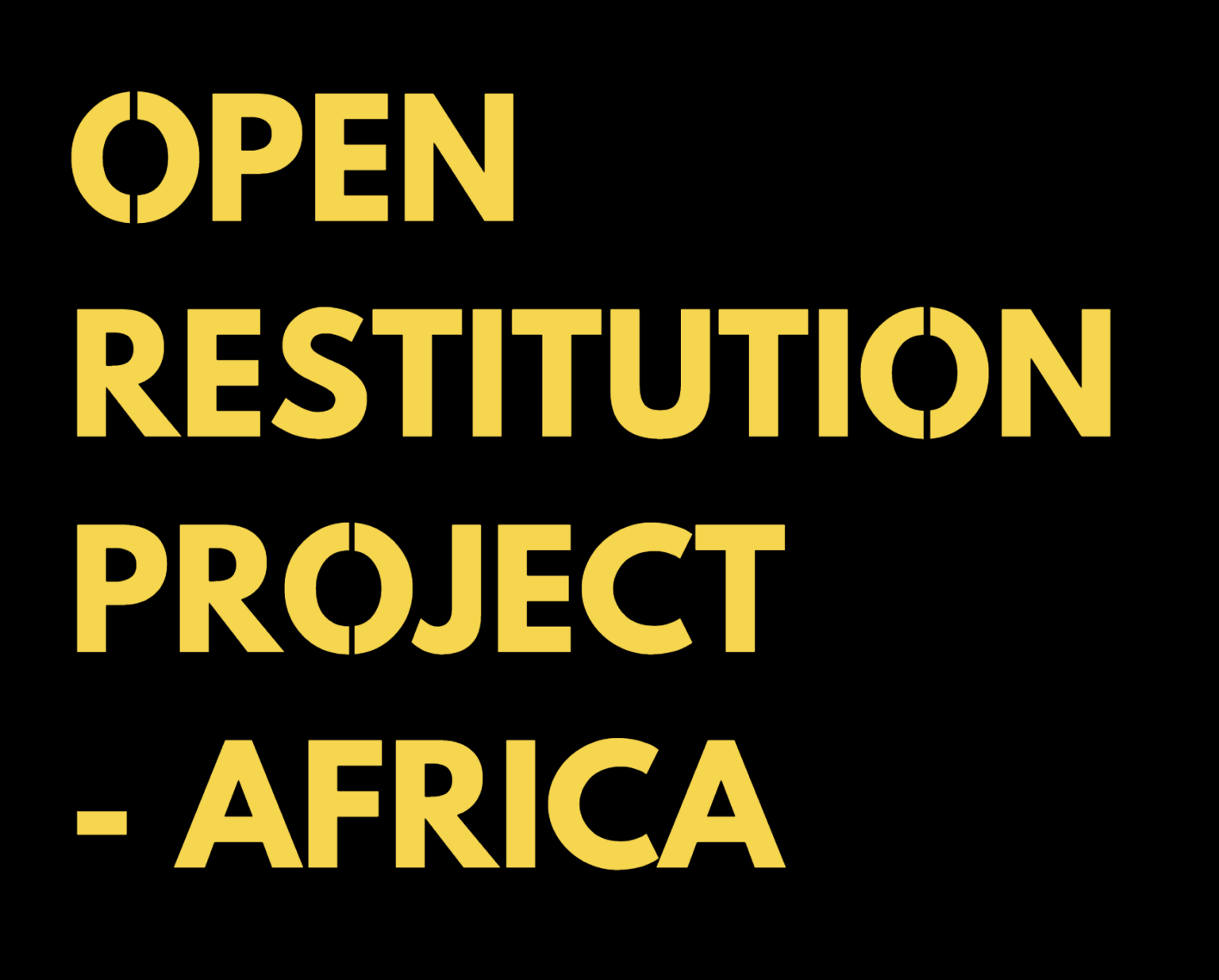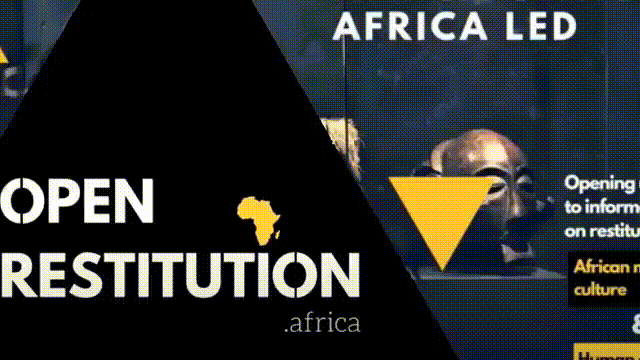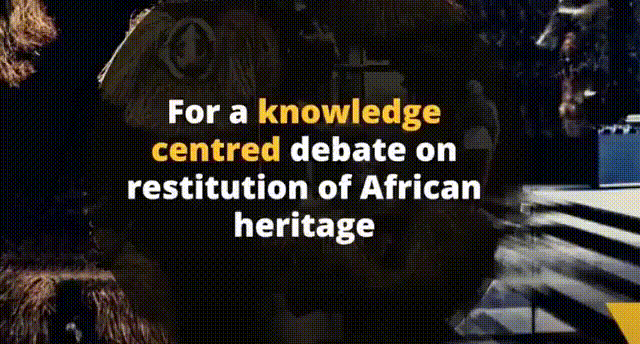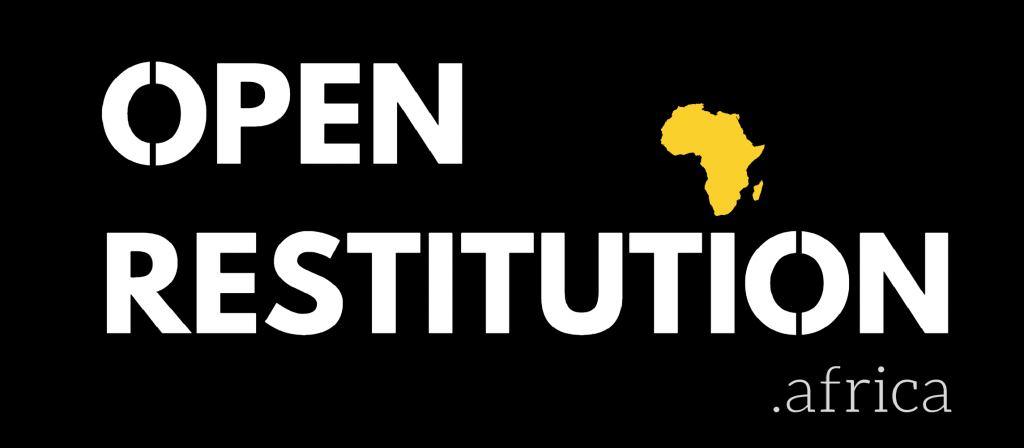

The ongoing debate in Germany about the restitution of African material cultures almost entirely focuses on voices from Europe. However, activists and scholars from the African continent have been working on this topic for a long time. Therefore this exhibition is an attempt to provide insights into an Africa-centric approach to the restitution debate.
The Open Restitution Project is an Africa-led project seeking to open up access to information on the restitution of African material culture and human ancestors, to empower all stakeholders involved to make knowledge-based decisions. The project will gather data on current restitution processes across the African continent, serve as a portal of case studies and best practice examples, and encourage a data-informed, in-depth and challenging debate on the complexities, responsibilities and ethical imperatives of restitution.

OpenRestitution.Africa is a collaborative project between Andani Africa and African Digital Heritage on restitution. BARAZANI.berlin wishes to thank Molemo Moiloa and Chao Tayiana for permission to present their work in this exhibition.
Chao Tayiana Maina is the founder of African Digital Heritage (Nairobi) and co-founder of the Open Restitution Africa initiative, as well as the Museum of British Colonialism. She holds an MSc in International Heritage Visualization from the University of Glasgow/School of Art and worked for the Science Museum Group as a software developer for digital museum exhibits. She was awarded the Google Anita Borg Scholarship for Women in Technology. Her work focuses on the application of digital technology to the preservation and dissemination of African cultural heritage.
Molemo Moiloa is co-founder of the Open Restitution Africa initiative. She leads research at Andani.Africa. Based in Johannesburg, she has been involved in various projects engaging with museum practice within her role at Andani.Africa and prior. Her experience includes substantial engagement with museum practice in South Africa, as well as experience in Namibia, Tanzania, Congo (DRC) and broader Pan-African projects such as serving as an advisor to the current MuseumFutures – Africa project led by Goethe Institut for Sub-Saharan Africa.


Open Restitution Africa Webinar with Dr. Njoki Ngumi
Dr Njoki Ngumi is a member of the Nest, a Kenyan multidisciplinary collective of artists, builders and makers, and the coordinator of learning and development for Africa’s first creative economy catalyst fund, HEVA. She leads and participates in policymaking and strategy, media analyses and debates, public education and dialogue, groundwork, pilots and practical interventions in the creative sector. She is a part of the IIP (International Inventories Program) – an international research and database project that investigates a corpus of Kenyan objects held in cultural institutions across the globe.
Njoki Ngumi:
»The object did not exist in a vacuum. It was not taken from a vacuum, it was taken from people.«
»Return might be easy. Restitution is the challenge.»
»There is so much money being earned by Western museums with our objects. the entrance fees, the coffee in the museum’s café, the souvenirs…This money shall go to Africa!«



Open Restitution Africa Webinar with El Hadji Malick Ndiaye
El Hadji Malick Ndiaye is a curator, researcher and writer based in Dakar, Sengal. His work focuses on contemporary art and the socio-historical foundations for its critical proliferation on the African continent. He teaches Art History and Cultural Heritage, collaborates with several magazines and participates in various international scientific activities. A theorist and curator, his publications focus on modern/contemporary art and global history, cultural policies and African museum institutions.
El Hadji Malick Ndiaye:
»Restitution will be an occasion to promote a rebalancing of the relations between African and European states.«
»What is contemporary restitution? When you return something you have taken illegally, there is not contemporary restitution. Restitution is always infinitive.«
»The debate on restitution is very important. We do not only discuss about objects. We discuss about many axes, that are deeply rooted in our culture. Our humanity, identity, memory and our history.«



Restitution Dialogues meets Object Movement Dialogues:
Actions on Object Return in Africa
Nana Oforiatta Ayim is a Writer, Filmmaker, and Art Historian who lives and works in Accra, Ghana. She is the Founder of the ANO Institute of Arts and Knowledge through which she has pioneered a Pan-African Cultural Encyclopaedia, a Mobile Museums Project, and put together a Presidential Committee for Museums that aims to create a template for a new kind of museum globally.
Nana Oforiatta Ayim:
»I think even before the objects came back, the thing to do is to talk to the communities the objects went away from. There is the objects on the one hand and there is the people on the other hand, and those two need to come together.«
»Listening is really undervalued…. Listening to the objects. There are people in our society who know how to listen to objects… To be able to hear the spirits of things… Listening to the objects, listening to the communities, listening. And within that act of listening something emerges that you couldn’t have imagined.«





